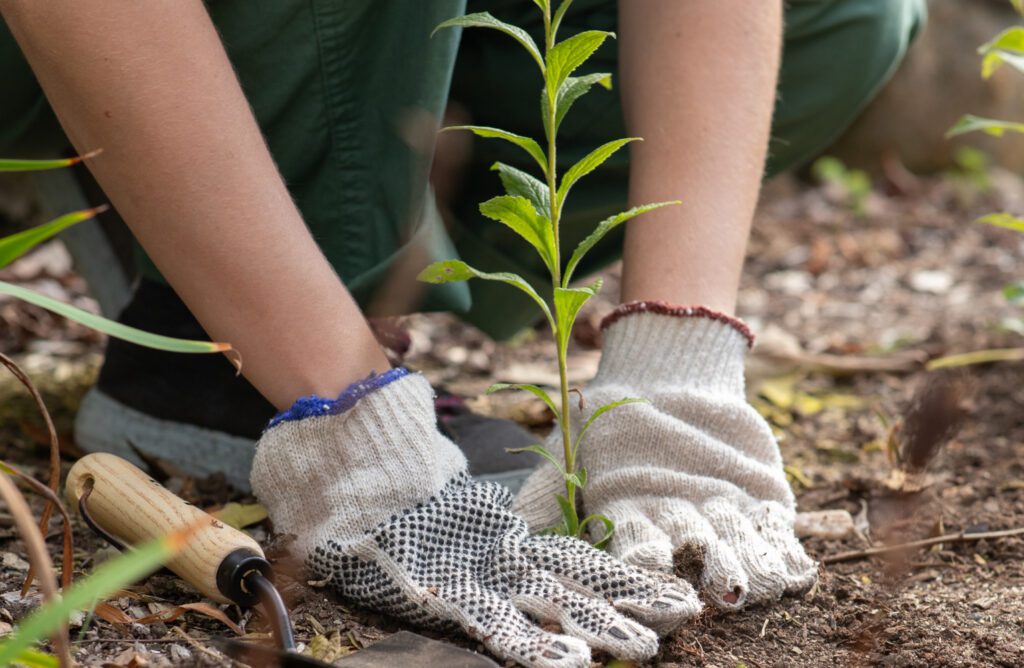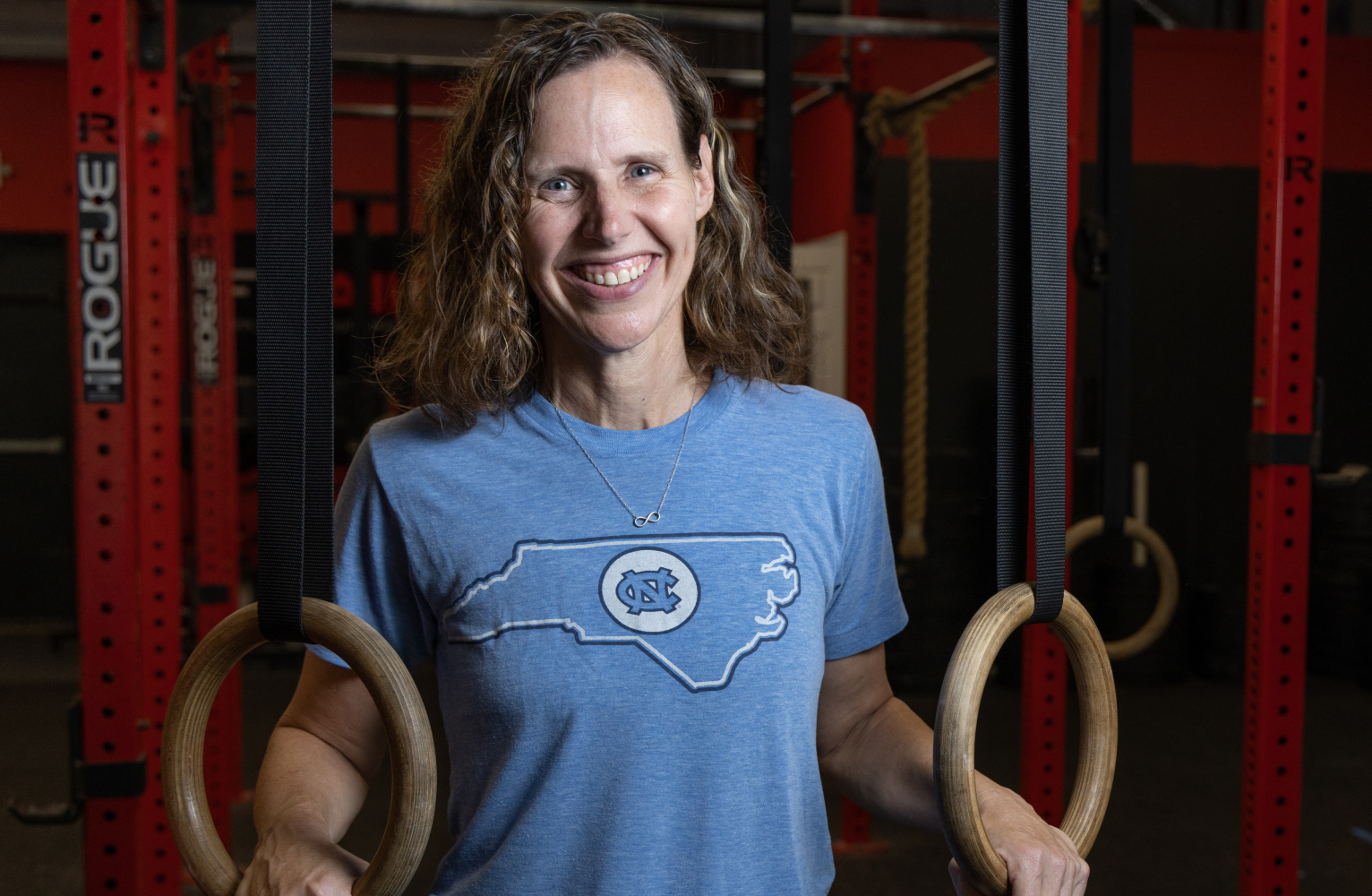
Edible Campus UNC is part of the North Carolina Botanical Garden and turns spaces around UNC-Chapel Hill into edible gardens, helping bring the campus community together around food and sustainable agriculture. Production gardens are the primary focus. The biggest garden is located in the heart of campus directly behind Davis Library. An additional eight satellite gardens are scattered across campus.
Edible Campus was started by Morehead-Cain Scholar Emily Auerbach ’15, who was concerned about food insecurity when she was a student.
The produce is free for anyone in the community, and the distribution process is simple: Everything is free for anyone to harvest. A student could be walking by the garden, see a ripe fig, pick it off the tree and eat it.
“Hopefully, there’s a mindset shift happening, and there being zero barriers helps people feel more ownership toward the landscapes around them,” said Kyle Parker, Edible Campus UNC program coordinator.
Parker is the only full-time employee managing the program. Otherwise, the gardens are maintained by a student leadership team that changes yearly and heavily relies on student volunteers throughout the year.
“Edible Campus is for students, by students,” Parker said. “It’s student hands out there in the gardens. I would have no chance of keeping up with everything by myself.”
The student leadership team is made up of five to 10 students who meet weekly to divide up tasks for gardening, events, social media and a newsletter. There’s also a volunteer workday every week, when Parker may get upwards of 20 volunteers to handle whatever tasks need to be done. This summer, two interns are helping Parker manage everything, including watering all nine gardens every day.
The gardens are filled with vegetables, fruits, herbs and native pollinators. Some of what’s growing includes mint, rosemary, lemon balm, tomatoes, basil, zucchini, squash, okra, cantaloupe, green beans, eggplant, peppers and cucumbers. See a full list of what’s growing in all of the gardens.
Edible Campus UNC also tries to plant culturally diverse foods to reflect the different communities on and around campus. For example, Asian varieties were planted this season because many of the Carolina Community Garden housekeepers are from Burma and like using the gardens. Parker said the housekeepers have communicated how happy they are to see food that is relevant to their diet.
“I tend to have crops out there that you might not see at your local grocery store,” he said. “Right now, we’re growing bok choy, Asian eggplant and dragon fruit.”
Some of the programming at Edible Campus includes a garden cooling demonstration, dinner with Carolina Dining Services and a composting workshop. They also do several plant giveaways from propagation lessons.
“This spring we gave away about 1,200 plants,” Parker said. “I taught students how to propagate plants, then we wheeled the plants out to the Pit. We always get swarmed by students when we give plants away.”
With the help of funding from a grant, Parker was able to construct a greenhouse last winter that, in his words, has been “an absolute game changer.”
“Since its inception last winter, we’ve produced around 8,000 seedlings in the greenhouse,” Parker said. “It allows us autonomy in deciding what varieties to grow. We can choose our own crops instead of relying on other producers. The greenhouse is probably the most important infrastructure upgrade in the history of Edible Campus.”
Edible Campus also recently built an aquaponics system, which is a sustainable farming method that combines raising fish (aquaculture) with growing plants in water (hydroponics) in a recirculating environment. Fish produce waste, which naturally breaks down into nutrients that fertilize the plants. In turn, the plants absorb these nutrients, helping to clean and filter the water before it cycles back to the fish. This process mimics nature, using 90% less water than traditional farming while eliminating the need for chemical fertilizers. Additionally, solar panels at the top of the system power the water pump, making it a completely self-sustaining system.
Beyond providing food and plants for free, there’s a natural level of beautification that Edible Campus UNC brings to campus. Every one of their beds includes upwards of 25 different species of native pollinator-friendly plants.
“It’s unique to have beds in the Pit or to have gardens in such an urban environment, where thousands of people are running around,” Parker said. “It’s incredible to have high utility landscapes in unusual places.”
Outside of the low barriers to accessing nutritious organic food, the gardens also foster community and positive mental health for the student volunteers and those utilizing the garden.
“It is an absolute joy to hang around after a workday and just have all the students look around and say, ‘Wow, we feel good’,” Parker said. “It makes me emotional at the end of the year because I always get student leadership and others telling me how important this work is to their college experience.”
Support Edible Campus UNC to help expand the program, provide tools and the opportunity to have future projects, infrastructure and programming that continue to positively impact the community.
Related Stories





